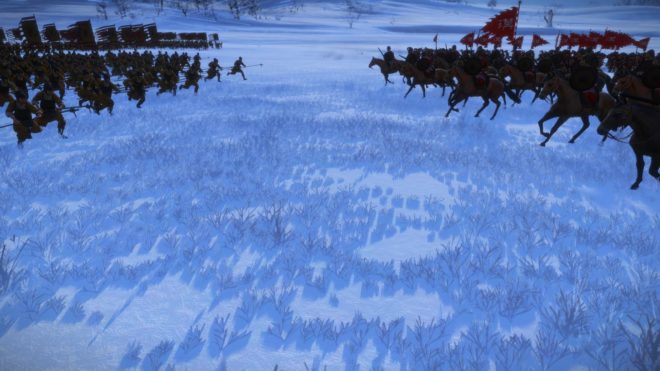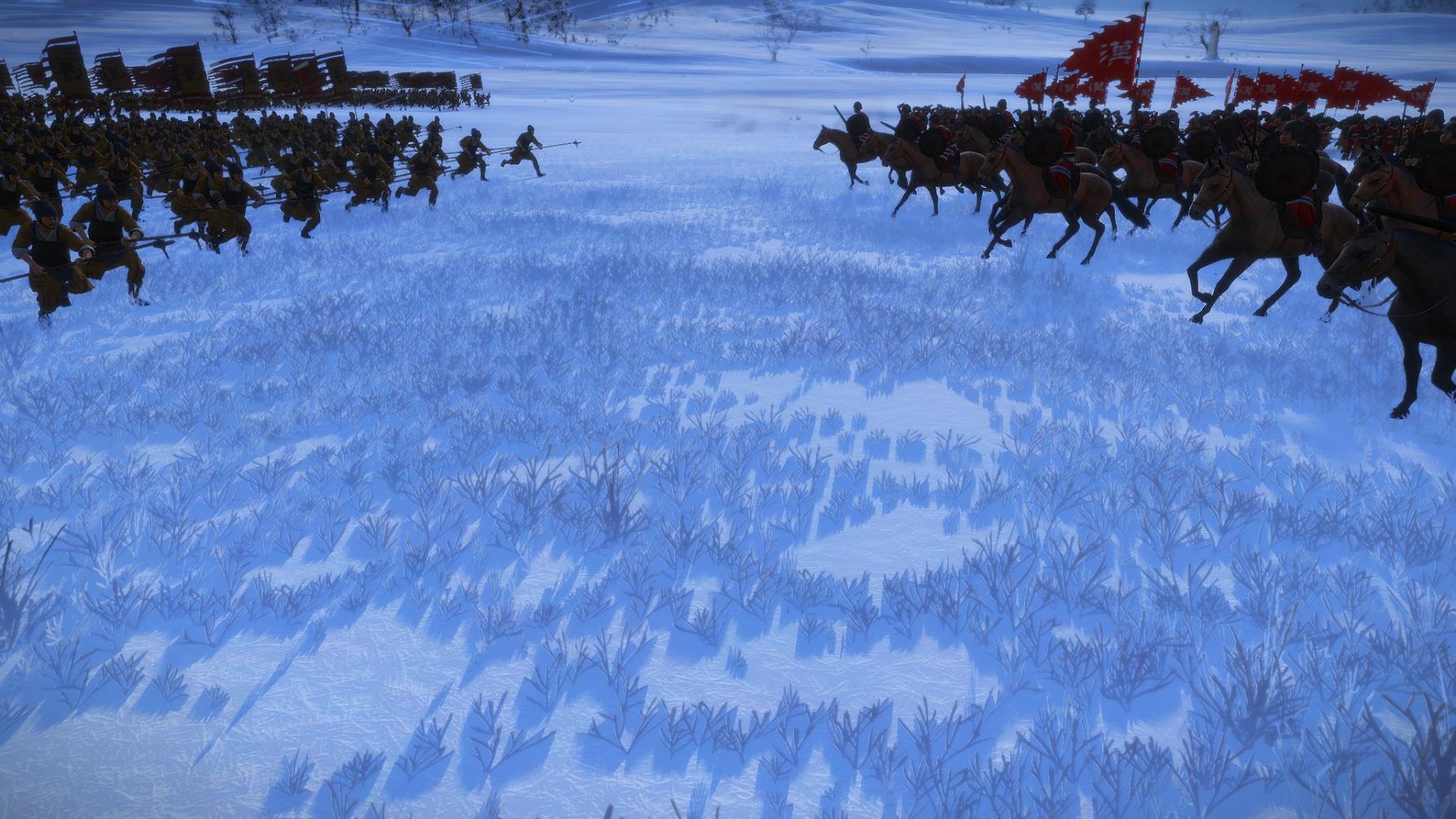Review: Total War – Three Kingdoms


Total War - Three Kingdoms
Overall Game Quality
(Four out of Five Ales)
As this is my first review I will note now, I am not generous with five out of five ale ratings. In order for a game to achieve that status it should be an industry revolutionizing game, or a hidden gem of incredible quality. That being said, this game is fun, and if you enjoy strategy games I'd highly recommend it.
It infuses the solid blend of turn based strategy with real time battles you know and expect from Total War games with a higher emphasis on player characters, and the most detailed Diplomacy and intrigue seen in any of the Total War titles. And it does this in a very interesting and engaging setting for a game of this style.
It does so with with a great amount of visual and audio flair, and with no notable bugs that I could find.
Innovation
(Four out of Five Ales)
As part of the well established Total War series, many of the elements of this game will be familiar to people who have played previous Total Wars titles. The setting will also be familiar to those who have played other Three Kingdoms games such as Dynasty Warrior. That being said, Total War itself is fairly innovative. It combines turn based strategic gameplay with real time battles, making it fairly unique in the strategy genre outside it's own imitators. On that basis I would give any Total War game a minimum of three stars for being part of an innovative series.
So the real question here is how innovative is Three Kingdoms itself when compared to other Total War titles? The answer is quite. For two primary reasons:
1. Total War focuses more on major characters than any of the previous titles I've played (The last one being Atilla). While Total War has a long history of family trees, generals and other characters that grow over time etc. Total War takes it to a whole new level. There is a stronger focus on character development in general.
For one, rather than a general being a commander of a unit that can easily die if that unit takes losses, the general is an individual character that is quite difficult to kill, and makes a surprisingly large impact on fights. In multiple fights I have found myself sending off a general/captain alone to route an whole squad of enemy units. Or having it back up a unit to turn a seemingly hopeless fight they are engaged in into a victory.
Second, you now have the ability sway generals outside your faction into joining your cause, and this is actually a major aspect of gameplay. With the time of the Three Kingdoms being a period of legendary figures in Chinese history, many of whom changed sides as the events unfolded, it's very appropriate the game allows you to focus on bringing these legendary figures into your army, with there even being achievements for taking certain characters into your service.
Third, generals can now deul in combat. If a duel is initiated both characters are ignored by the rest of the forces on the map as they fight it out. Given the aforementioned value of generals in combat, taking out enemy generals in duels can be a very effective way to turn the tide of battle in your favor.
Finally there is just a lot of focus on character personality, not only do characters make comments before the battles (as a seeming replacement for pre-battle speeches of other Total War games) but also they make comments at each other during the battle so that it's hard to forget your generals are major figures with personalities.
2. Diplomacy is majorly changed from previous Total War titles. Many of the elements are familiar but they are just a lot deeper. Probably the greatest aspect being that if you form coalitions and alliances members of them will vote on certain actions such as bringing new members in or declaring a joint war. In these votes your influence on other members of the alliance or coalition plays a major part, with members who you have more influence over being more likely to follow your lead in making decisions.
Haggling over deals has also been improved with numbers displaying just how favorable or unfavorable your negotiating partner finds a deal to be. This allows you to adjust deals with a lot of precision before they are accepted. For instance say you have a surplus of food and offer food to someone and are seeking regular payments of gold in exchange. You can adjust the payment until they accept without a lot of guesswork and chance involved.
You can also extort people by threatening to declare war unless they meet certain conditions. There is more guesswork involved in this and if your demands are too stiff you will automatically go to war with them when they decline, but it gives an interesting new layer to diplomacy.
Character Control and Combat
(Four out of Five Ales)
Not much has changed here if you are a Total War veteran. You direct units around in real time but may pause to make detailed commands. You can also use formations to make it easier to organize large groups of units. In addition some units have special abilities that can be activated at key moments in combat to give your side advantages.
On the campaign map, you move units around with a certain amount of action they can take each turn, and various campaign map stances that give benefits. You can upgrade various aspects of the cities you control, adjust taxes to balance income with the happiness of the populous, etc.
Customization
(Three and a half of Five Ales)
Like previous Total War titles you can equip generals, customize skill points they earn etc. Three Kingdoms has more items, and they seem to play greater role of importance. However the factions themselves are fairly non-customizable, with your faction bonuses, starting position etc. being governed by your initial pick and certain bonuses really prompting you to seek alliances with certain factions but not others. Ultimately your choices matter more and more the father into the game you go, but some choices are simply better than others early on. This makes sense for the game, and doesn't really detract from the experience, but still earns this game a lower customization rating than say, a strategy game that allows you to build customized factions.
Challenge / Pacing
(Five out of Five Ales)
Not only can this game be challenging, but it can be challenging in precisely the way you want it to be between the factions and the difficulty sliders you can put yourself in situations where the combat is easy but the diplomacy / strategy end will be difficult, or the combat will be difficult and the strategy easy, or really any type of balance between those factors you are looking for. Certain factions and settings will be friendly to any player, others will push the skills of a veteran Total War player to their absolute limits. The challenge level is really whatever you want it to be, so in that regard it's a clear five out of five.
Monetization
(Two out of Five Ales)
The base game package is fun. It's also sixy bucks. And without pre-ordering or getting the early adopter bonus three of your starting options (The three Yellow Turban generals) are paid DLC. Total War has been following a monetization model of giving a base game with a limited number of factions, adding in factions and charging you for them, and then adding additional sub-campaigns in the same game system as DLC for a long time. The general idea of the system is probably a 3 out 5 ale system for me, except the game has such a hefty initial price tag charging us for each and every additional feature seems to be fleecing us a tad.
Immersion / Artistic Appeal
(Four out of Five Ales)
As a historical Total War characters and setting are generally pretty realistic, however they've found a way to to infuse cutscenes and other elements such as parts of the map with the charm of period appropriate Chinese art. The setting itself is quite pleasing to the eye, the units add to the feel, and the music really puts you in the setting. Then there is all the focus on the character's personalities... overall I just love the feel and theme of this game. And if you're a major enthusiast of the Three Kingdoms setting I would expect you may love it even more.
Store / Lore
(Four out of Five Ales)
If you don't know much about the Three Kingdom's setting, it's set at the end of the Han Dynasty and following it's fall, before the rise of the Jin dynasty. While there are many factions in this setting the three most famous are the Three Kingdoms of Wei, Wu, and Shu. It's a period of intense civil war and larger than life personalities. Total War three kingdoms does it's best to represent that unrest, some of the period appropriate events, and the many personalities involved. The story can only be so set with the player rewriting history and ideally, making their faction produce the new emperor of China, but they create a great setting for the player to do that.
Stability Performance
(Five out of Five Ales)
If there are bugs (and I'm sure there must be some) I haven't encountered a single one of them in my time playing this game and I bought it the day after launch. This seems to be a very well polished release.
*IRRELEVANT MEASURES*
Crafting / Economy - There is no crafting and while there is an economy, it exists purely as a strategic element of this game's gameplay, and as such is counted part of the challenge / pacing element of this game.